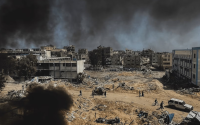by U.S. Senator Paul Wellstone (D-MN)April 30, 2002
"Mr. President, like many of my colleagues, I had enormous hopes for a permanent peace between Israel and the Palestinians before the collapse of the Oslo-Camp David peace process two years ago. Yet recently, as we all know, the situation in the Middle East has deteriorated dramatically, and what we have witnessed there is heart-breaking.
"As I speak today, Palestinian gunmen remain holed up in the Church of Nativity, Israeli tanks are present in the West Bank, and Israeli and Palestinian civilians, seized by anxiety, fear stepping into the street in order to go about their daily lives. Across the region and in this country too, people are grieving for innocent Israelis and Palestinians who have lost their lives.
"While there are new reports of clashes in Hebron, there is some positive news this morning. The month-long standoff at the Ramallah compound may be ending as U.S. and British security experts are expected to arrive today in the region to implement a U.S.-brokered plan. There are also signs of progress in Bethlehem, where there are news reports that many civilians not wanted by Israel will leave the church today.
"Even in this time of terrible violence, however, we cannot lose hope, for the sake of Israelis and Palestinians everywhere who yearn for peace - and especially for their children, and the generations to follow. For them, we must continue to seek a pathway to peace.
"To that end, Secretary Powell's mission to the region earlier this month was an important step. While a cease-fire was not achieved, the situation is less dangerous now than it might have been, without active US engagement and Powell's vigorous diplomatic efforts. Events were spinning out of control earlier, especially on the border of Lebanon. But, the tense border situation seems to have cooled a bit, even if momentarily, due at least in part to Secretary Powell's work with the Syrians.
"The real test, however, is whether the administration will stay engaged. It has finally left the side-lines and is onto the playing field of Middle East diplomacy, and it must stay in the game. Israeli officials say that conditions might worsen in the days to come, that Israel may witness a rash of suicide bombings as it pulls its forces back. If the administration, facing such an escalation of violence in the region, withdraws, as it has before, history will judge us harshly. If it continues to devote its time, energy and prestige to achieving the goals Mr. Bush laid out earlier this month, then the violence might be contained, and we may see progress. Engagement remains the only intelligent option for our country now.
"We must pursue a courageous approach which seeks both to meet the critical need of the Israeli people to be free from terrorism and violence, and acknowledges the legitimate aspirations of the Palestinian people for their own state, a state which is economically and politically viable. Even in this horrific time, we must not lose sight of what should be our ultimate goal: Israel and a new Palestinian state living side-by-side, in peace, with secure borders.
"For many, the last two years have shattered confidence in any peace process. It has raised questions in some people's minds about whether Palestinians and Israelis can ever really live and work together, supporting each other's aspirations for peace, prosperity and security.
"But we must do our best to work with the parties to restore calm, to end the bloodshed, and to get back to a political process that might address the underlying causes of this conflict.
"I believe many of the elements of the path back to peace are known:
"First, Palestinian leaders need to renew their severely damaged credibility as legitimate diplomatic partners by condemning terrorism and doing all in their power to combat it. Chairman Arafat has not consistently rejected or confronted terrorists; indeed if the evidence gather by the IDF is to be believed, he may have actually supported them. He cannot play both sides any longer, but must work to end terror and the sickening wave of suicide bombings Israel has suffered.
"There must also be an end to the culture of violence and the culture of incitement in Arab media, in schools and elsewhere, which Arab and Palestinian leadership have allowed to go unchecked too long. Throughout the region, anti-Israel incitement is widespread and insidious: government-controlled press, television programs and school textbooks regularly demonize Israelis with vile language and images. Arab states must help put an end to this, as it badly damages all the parties and powerfully undermines the cause of the Palestinian people and their national aspirations.
"President Bush and the international community have called on Israel to end its incursion into the West Bank, and Israel has begun a withdrawal, however partial and tentative. As President Bush stated, when Israel moves back, responsible Palestinian leaders and Israel's Arab neighbors must step forward, and demonstrate that they are working to establish peace: "the choice and the burden will be theirs". To that end, the Palestinian leadership must commit to resuming security cooperation with Israel, and the United States and the international community must assist the Palestinians in reconstituting an effective security mechanism so they can do so.
"Second, Israel must show a respect for and concern about the human rights and dignity of the Palestinian people who are now and will continue to be their neighbors. It is critically important to distinguish between the terrorists and ordinary, innocent Palestinians who are trying to provide for their families and live an otherwise normal existence. Palestinians must no longer be subjected to the daily, often humiliating reminders that they lack basic freedom and control over their lives.
"Third, the United States and the international community must begin immediately the urgent task of rebuilding so that ordinary Palestinians can resume a normal existence. The Palestinian economy has been battered and the infrastructure of the Palestinian Authority badly damaged. Last week, the World Bank identified a $2 billion need, estimating that the direct physical destruction of the public infrastructure alone is at $300 million, and that at least 75% of the Palestinian workforce is now idle. At the same time, Israel is facing major economic challenges, with a serious recession and currency dropping to a new low recently. The international community and Israel's Arab neighbors must contribute to serious rehabilitation and economic development efforts.
"Consistent with the UN Security Council resolutions, the United Nations fact-finding team must be allowed to visit the territories to examine what actually happened in the Jenin Refugee Camp. As Secretary Powell has declared, this is in the best interests of all concerned, especially in the best interests of the Israelis, to end speculation and have a full, accurate, public accounting of what actually occurred there. As soon as details on the composition of the team is resolved and the scope of its mission agreed upon, it must be allowed access to conduct its work.
"Fourth, I believe there is no military solution to this conflict. The only path to a just and durable resolution is through negotiation. And there will be no lasting peace or regional stability without a strong and secure Israel, which is why the United States must maintain its commitment to preserving Israel's strength, and providing Israel substantial assistance.
"I believe the United State must now push forward with specific and concrete ideas for rebuilding the shattered trust between the parties, bringing an end to the violence, and offering a new path back to the road of peace. The points of departure for such a plan are already in place - the UN Resolutions 242 and 338 and the earlier settlement negotiations conducted at Taba, Egypt in January 2001. The recent Arab League support of the Saudi proposal for normalization of relations between Israel and Arab nations is key. It acknowledges Israel's right to exist, and raises hope of a constructive Arab involvement in the search for peace. The United States should also consider supporting, with the consent of both parties, some kind of international observer force to enhance security for both sides. NATO might choose to take part in any such deployment, given Europe's continuing interest in containing the Middle East crisis. This could be followed, again with the agreement of all parties, with an international peace keeping force, if such a force could be helpful.
"We cannot afford to dither. The administration should move decisively to convene a broad international conference loosely based on the Madrid conference of 1991, at which the exchange of land for peace became the basis for negotiation. The goals of the conference should be spelled out clearly: putting the breaks on the violence and speeding negotiations for a two-state solution.
"Both sides will need to make painful choices if there is to be a just and stable peace. There must be a recognition of the tragic Palestinian refugee experience, and also an understanding that not all Palestinians refugees will be able to return to Israel. Many observers believe that the parties will eventually need to agree on a formula which would allow some refugees to return to Israel, and then provide for resettlement, and financial compensation for the remainder. And consistent with the Mitchell plan, Israeli settlement expansion in the occupied territories will have to be reconsidered and, as many observers have noted, some settlements may need to be dismantled. All of this should be negotiated by the parties themselves.
"Despite the rage and raw feelings in the region now, most Israelis and most Palestinians crave a peaceful resolution to this conflict. This hunger for peace, and a sustained and vigorous engagement by the United States, is our best hope for achieving it."
http://wellstone.senate.gov/On_the_Record/Press_Releases/Foreign_Relations/middleeast4.htm






